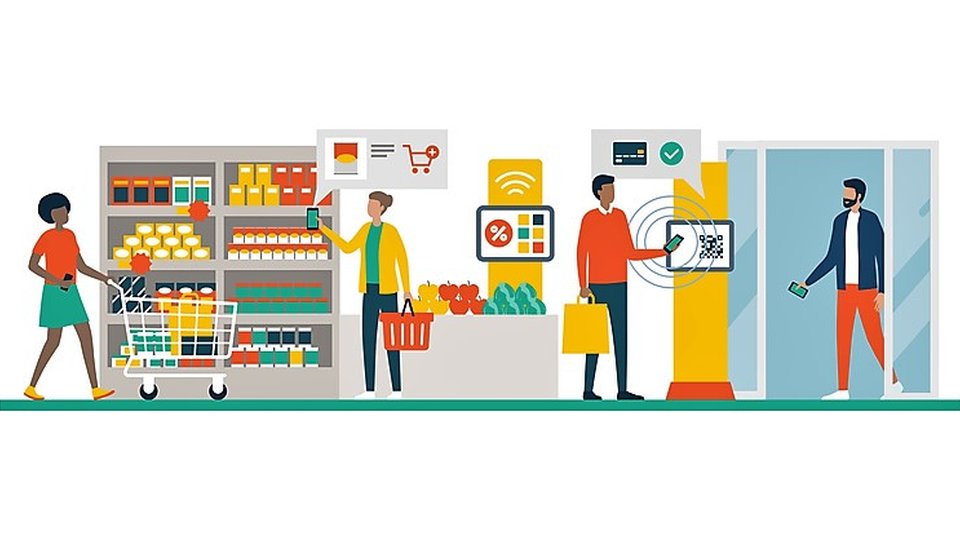Commentary
Will self-service kiosks support today's retail environment?
One day the pandemic will be a memory, but as with most historical events, it’ll leave a wake of change in its path. For retail, this may mean a new lineup of strong retail survivors, a greater emphasis placed on omnichannel offerings and a changed customer mindset surrounding the in-store experience

November 2, 2020 by Katie Kochelek — Senior Marketing Specialist, Frank Mayer and Associates, Inc.
Editor's note: An earlier version of this article ran on Retail Customer Experience, a Kiosk Marketplace sister website.
Since the COVID-19 pandemic began dominating headlines earlier this year, retailers and brands have been forced to demonstrate agility when meeting new customer expectations. More than ever, the transformed consumer now counts on operational supply chains, accessibility and arguably most important, enhanced safety standards.
While retail stores strategize short-term goals to meet health regulations, maintain stocked shelves and keep doors open, many are also considering the impact a changed customer mindset will have on today's brick-and-mortar shopping.
As is often the case, a solution lies with technology. While more shoppers return to stores, retail self-service kiosks offer the safe contactless experience and endless aisle options they now seek.
The retail elephant in the room
Before we dive into how self-service kiosks can assist retail, though, it's important to address the more pressing concern about the industry first. Can it bounce back?
There's no shortage of literature on which retailers will withstand the economic downturn and which will regrettably succumb, but a consistent theme throughout much of the discussion is that the pandemic hit the gas pedal for most. If a store or brand was already slow to adopt a multichannel approach, the last few months only magnified the issues. But if a big-name retailer had been in the midst of strategizing their customer experience plans with processes like buy-online-pickup-in-store amongst others, they learned the importance of rolling them out quickly and staying nimble.
Fortunately, recent consumer research has some promising predictions for retail as a whole. In the study "September 2020 Shopper Sentiments," Mood Media surveyed 8,000 shoppers about their outlook on shopping. Some key takeaways included:
- 67%of global consumers say they've already returned to non-essential retail stores.
- 80% feel reassured by safety measures retailers have put into place.
- More than half surveyed expected shopping habits to return to normal by next summer.
The stores that make it through this rough period will be the ones that come out better positioned to address the needs of our omnichannel world while still fulfilling the desire for brick-and-mortar experiences. And along the way, self-service technology will be an integral strategy to help retailers offer both.
Interactive kiosks promote customer and employee safety
According to Incisiv's 2020 Shopper Study, "The New Store Shopper in High-Touch Retail," 96% of shoppers interviewed this summer said they are very unlikely to seek in-store conversations with store associates over the next six months.
It's no surprise. Current studies indicate COVID-19 is spread from person-to-person through respiratory droplets, so social distancing guidelines have been the new way of life.
With customers avoiding face-to-face contact with store associates, retail self-service kiosks can be a store's answer to providing the high level of customer service shoppers expect — but safely.
Geoff Bessin of Intuiface explains why in the article, Despite COVID-19, touchscreens aren't going anywhere, written for Kioskmarketplace.com.
"[Touchscreen kiosks] are a far safer alternative to human-human interaction," Bessin writes. "Maybe I can't control the cleanliness of the touchscreen, but I can control the purity of my hands immediately after — particularly if there is a sanitizer station nearby. What I certainly cannot control is the health of the person to whom I'm speaking."
With less customer desire to interact with a person, stores will need to employ a range of retail kiosk solutions to satisfy the continued expectation of exemplary service. Expect these to look like locker systems that allow for curbside and entryway pickup, wayfinding kiosks and expanded self-checkout options.
These various forms of self-service kiosks will not only help customers avoid illness, but will further their comfort level with self-service technology — an experience that was already becoming mainstream before the pandemic began.
Endless aisle kiosks fill the inventory gaps
Even in normal times, inventory management requires careful planning. Add in a pandemic that strips the shelves of toiletries, curbs foot traffic to retailers and impedes spending in certain goods categories, and it's enough to make a supply chain manager's head spin.
As many states entered various levels of quarantine, mandates kept shoppers out of most stores. Even as restrictions have eased, customers have still been reluctant to venture back as often as before due to safety concerns. As a result, stores have been less inclined to stock excess product.
Endless aisle kiosks can mitigate the frustration of a shopper discovering an empty shelf or not finding an item in the right size or color. Instead of risking a customer returning home and failing to complete the purchase on the retailer's website, or worse, opting to buy from a competitor, stores can still capture his or her dollars by offering an endless aisle opportunity to continue a purchase.
The future of kiosks in the retail environment
One day the pandemic will be behind us. But, like most major historical events, it'll leave a wake of change in its path. For retail, this might mean a new line-up of strong retail survivors, a greater emphasis placed on omnichannel offerings, and a changed customer mindset surrounding the in-store experience.
And while self-service technology like retail kiosks will help stores address immediate shopper concerns during these months, they'll offer long-term solutions to retailers looking to continue a healthy and customer-focused environment well into the future.
For an update on how the coronavirus pandemic is affecting kiosks, click here.
About Katie Kochelek
More From CommentaryMore
Included In This Story
Frank Mayer and Associates
Custom Kiosk Design | Manufacturer
Frank Mayer Kiosks and Displays specializes in large-scale rollouts of custom digital kiosks for enterprise and growth-oriented brands. With a relentless focus on premium design, customization, and end-to-end service, we manufacture self-service customer engagement solutions that expand market reach, boost sales, and enhance brand equity.










